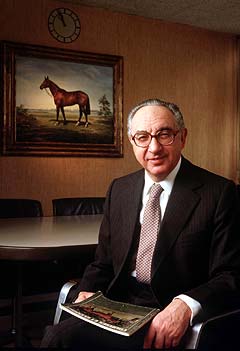Related Research Articles

Vickers was a British engineering company that existed from 1828 until 1999. It was formed in Sheffield as a steel foundry by Edward Vickers and his father-in-law, and soon became famous for casting church bells. The company went public in 1867, acquired more businesses, and began branching out into military hardware and shipbuilding.
Marconi Electronic Systems (MES), or GEC-Marconi as it was until 1998, was the defence arm of General Electric Company (GEC). It was demerged from GEC and bought by British Aerospace (BAe) on 30 November 1999 to form BAE Systems. GEC then renamed itself Marconi plc.
The General Electric Company (GEC) was a major British industrial conglomerate involved in consumer and defence electronics, communications, and engineering. The company was founded in 1886, was Britain's largest private employer with over 250,000 employees in the 1980s, and at its peak in the 1990s, made profits of over £1 billion a year.
The Plessey Company plc was a British electronics, defence and telecommunications company. It originated in 1917, growing and diversifying into electronics. It expanded after World War II by acquisition of companies and formed overseas companies.
British Thomson-Houston (BTH) was a British engineering and heavy industrial company, based at Rugby, Warwickshire, England. Originally founded to sell products from the Thomson-Houston Electric Company, it soon became a manufacturer using licenses from the American company. They were known primarily for their electrical systems and steam turbines.
Racal Electronics plc was a British electronics company that was founded in 1950.
Kelvinator was an American home appliance manufacturer and a line of domestic refrigerators that was the namesake of the company. Although as a company it is now defunct, the name still exists as a brand name owned by Electrolux AB. It takes its name from William Thomson, 1st Baron Kelvin, who developed the concept of absolute zero and for whom the Kelvin temperature scale is named. The name was thought appropriate for a company that manufactured ice-boxes and refrigerators.

Ferranti or Ferranti International plc was a UK electrical engineering and equipment firm that operated for over a century from 1885 until it went bankrupt in 1993. The company was once a constituent of the FTSE 100 Index.
Founded in 1907, Electrohome was Canada's largest manufacturer of television sets (TVs) from 1949 to 1987. The company was also involved in television broadcasting, and was a leader in data, video, graphics displays and projectors.
The Marconi Company was a British telecommunications and engineering company that did business under that name from 1963 to 1987. Its roots were in the Wireless Telegraph & Signal Company founded by Italian inventor Guglielmo Marconi in 1897, which underwent several changes in name after mergers and acquisitions. The company was a pioneer of wireless long distance communication and mass media broadcasting, eventually becoming one of the UK's most successful manufacturing companies. In 1999, its defence equipment manufacturing division, Marconi Electronic Systems, merged with British Aerospace (BAe) to form BAE Systems. In 2006, financial difficulties led to the collapse of the remaining company, with the bulk of the business acquired by the Swedish telecommunications company, Ericsson.
Thales Underwater Systems or TUS is a subsidiary of the French defense electronics specialist Thales Group. It was created in 2001 and belongs to its naval division. It specializes in the development and manufacturing of sonar systems for submarines, surface warships and aircraft, as well as communications masts and systems for submarines. Its headquarters are located in Sophia Antipolis, France.

Pye Ltd was an electronics company founded in 1896 in Cambridge, England, as a manufacturer of scientific instruments. The company merged with EKCO in 1960. Philips of the Netherlands acquired a majority shareholding in 1967, and later gained full ownership.

Arnold Weinstock, Baron Weinstock, Kt. OMRI, was an English industrialist and businessman known for making General Electric Company one of Britain's most profitable companies. The City criticized Weinstock for his financial caution but after he retired as managing director in 1996, under his successor a series of ill-judged acquisitions led to catastrophic losses.

AWA Technology Services, name based on former name Amalgamated Wireless (Australasia) Ltd, is an Australian provider for technology related services. Throughout most of the 20th century AWA was Australia's largest and most prominent electronics organisation, undertaking development, manufacture and distribution of radio, telecommunications, television and audio equipment as well as broadcasting services.
Ultra Electronics Holdings is a British defence and security company. It was listed on the London Stock Exchange and was a constituent of the FTSE 250 Index until it was acquired by Cobham, which is itself owned by Advent International.
Morphy Richards is a British brand of electrical appliances headquartered in Swinton, in South Yorkshire, England. Its products were formerly made at its historic home of Mexborough, and in other facilities across the United Kingdom. However, since the 1990s, all of its manufacturing is now carried out in the Far East.

A.C. Cossor Ltd. was a British electronics company founded in 1859. The company's products included valves, radios, televisions and military electronics. The company was purchased by Raytheon in 1961.
Sir Michael Sobell was a British businessman, a major philanthropist, and a prominent owner/breeder of thoroughbred racehorses.
Email Limited was a manufacturing conglomerate operating mainly in Australia, best known for domestic electricity meters and major appliances.

EKCO was a British electronics company producing radio and television sets from 1924 until 1960. Expanding into plastic production for its own use, Ekco Plastics produced both radio cases and later domestic plastic products; the plastics company became Lin Pac Mouldings Ltd.
References
- ↑ "Sobell Industries". Grace's Guide. 23 February 2015. Retrieved 19 September 2017.
- ↑ McMichael (1979). "McMichael Company History" . Retrieved 19 September 2017.
- ↑ Pontypridd Observer, 31 December 1960, page 1